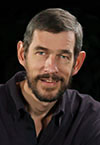 Published in Light & Life, July/August 2006
Published in Light & Life, July/August 2006
The young man next to me prayed, “Lord, we just pray you would, like, send your Holy Spirit. Amen.”
A polite suggestion, I thought. But didn’t Jesus tell us to boldly persist like the guy who banged on his friend’s door at midnight (Luke 11:5-10)? How obnoxious! Yet God wants us to pray this way.
I long to see the Holy Spirit poured out in churches and cities across our nation. But I struggle with my worst enemy: myself. My biggest problem is complacency, because it keeps me from overcoming everything else. I have found only two cures for complacency: persecution (which not many of us choose) and hunger for God. Hunger for God generates in me a craving for more of God and a dissatisfaction with the attractions and the status quos of the world, the church, and myself. Hunger for God fuels bold, persistent, passionate prayer—prayer that never wants to go back to polite respectability.
Here’s the story of one man who hungered voraciously for God. He banged on heaven’s door and changed the spiritual landscape around him. He was the private face behind the great nineteenth century revivalist, Charles Finney, who led thousands to faith in Christ.
In the 1820s and 30s Finney initiated new methods in revivals that we still use today: the altar call, planning and publicizing revival meetings, mobilizing people for home visitation, and recruiting people to pray for meetings. He famously promoted his methods as a major key to revival, contending that a revival resulted from the right use of appropriate means. It just needed God’s blessing. The transformation of towns and cities proved it. His lesson to us: Correctly perform the right methods, and you’ll get revival. Ever since then Christians have tried to program the Holy Spirit into doing something.
The truth about Finney’s effectiveness in revivals seems to have had little to do with his methods and much to do with a person. The private face of these revivals was that of a man whom few people saw and whom Finney talked astonishingly little about: Daniel Nash.
We have no drawing or any physical depiction of Nash. Until recently no books were ever written about him. He pastored a rural church for six years, leading it into a true revival. Yet, since they didn’t like his traveling and wanting a younger man, they voted him out. An eye inflammation nearly blinded him, and through this he emerged a healed man of intense prayer. He joined Finney and went into towns ahead of Finney to pray. He recruited others to pray with him, and he often fasted and prayed day and night for three or four weeks before the meetings started. In hotels and boarding rooms and basements he groaned and agonized for hours at a time over nonbelievers whom he prayed would come to faith. He prayed through the duration of every meeting. And he rarely showed his face.
Finney’s greatest and most famous ministry happened in Rochester, NY, in 1830-31. As always, Nash prepared the way with fasting and prayer and continued the entire time. Records show that across that region crime plummeted, churches grew, and years later over 80 percent of converts stayed active in churches.* This is unheard of today.
Hunger for God generated Nash’s prayer, which stands out again and again as the spiritual power behind Finney, the great evangelist. Without it the methods would have been mere activities—and we all do plenty of that.
Why am I so sure of this? Within four months of Nash’s death in December 1831, Finney (still in his prime) withdrew from full time evangelism. In 1832 he took a pastorate in New York City and later became a professor, then president, of Oberlin College. The revival lasted until the mid 1840s. But during this time his evangelism was less frequent and more likely to be done in areas where the Spirit was already working.
Methods attract people but not the Holy Spirit. Methods may lead some people to confess their sins, but they do not produce genuine converts who grow in faith. Only the Holy Spirit can deeply change a heart. The Holy Spirit is poured out at a price not many will pay. But some will! Will you?
Prayer that impels the outpouring of the Holy Spirit rises from a hungry heart. Prayer motivated by desire for a great meeting—though that’s not bad—will never generate the passion to prevail through every hindrance. A hungry heart cries out to God boldly and persistently.
In Psalm 63:1 David prays passionately, “O God, you are my God, earnestly I seek you; my soul thirsts for you, my body longs for you, in a dry and weary land where there is no water” (NIV). Like all of us, David struggled with his shortcomings. But he desired God so much he thought of it graphically and felt it physically. God pours out His Spirit not because we’re good but because we long for Him.
Too often we ask God to do something, say “Amen,” and go on with the day. When we truly desire God more than the things of this world, we find a new passion rising in our prayer. That passion keeps us praying long after others stop.
We may not pray quite like Daniel Nash, but God hears our prayer. We don’t have to know a lot. But how deep is our desire? Do we want God and the work of His Spirit more than anything else?
We need not worry that we don’t have what it takes, or that we’ll fall short. Here is good news for everyone: Whenever we seek God, we always benefit, even if we don’t get a big revival. How? In the very process of seeking God, we ourselves get renewed. It happens every time.
Note
*J. Paul Reno, Daniel Nash: Prevailing Prince of Prayer. Asheville, NC: Revival Literature, 1989, pp. 3–10.
Photo credit: © Wuka | www.stockfreeimages.com








I hope also in my died become as
Look like date nash …so become a
Pray.